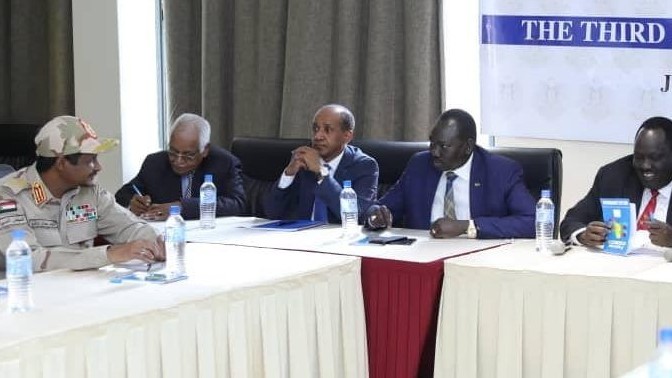On Tuesday, December 17, the transitional government of Sudan agreed to cease hostilities in the States of Blue Nile and South Kordofan, in a deal reached with the Malik Agar-led faction of the armed rebel group, the Sudan People’s Liberation Movement-North (SPLM-N). The government also agreed to open corridors for the delivery of humanitarian aid to the populations of the two States.
The development comes as a welcome step towards accomplishing one of the most important tasks set before the transitional government – to put an end to the civil war ongoing in the two States since 2011, which has left over 1,500 dead and more than 500,000 people displaced.
Sudan Tribune reported that as per the agreement, a joint committee will be set up to study the needs of the affected population, identify the crossing points and specify the corridors through which humanitarian aid can be delivered.
The signatories also agreed on mechanisms to monitor compliance with the ceasefire in the Blue Nile and South Kordofan, which are largely under the control of SPLM-N Agar faction.
General Mohamed Hamdan Dagalo, one of the government’s sovereignty council members appointed by the former military junta, signed the agreement with Malik Agar in South Sudan’s capital city of Juba, where the peace negotiations have been ongoing.
Present at the signing ceremony were other members of the sovereignty council and members of the Sudanese Revolutionary Front (SRF), which is a coalition of different armed rebel groups in the country, along with representatives from the African Union (AU) and the Declaration of Freedom and Change Forces (DFCF).
The DFCF is an umbrella organization of left and centrist opposition political parties which came together to represent the protest movement in Sudan which after months in the streets deposed the former dictator Omar al-Bashir. After al-Bashir was driven out they continued their struggle and forced the military junta, which had subsequently assumed power, to make way for a civilian-dominated transitional government.
The talks between the transitional government and the armed rebels were originally set to conclude by December 14. However, with considerable differences left to be resolved, the SRF and the transitional government agreed to extend the deadline to February 14, 2020.
As per the constitutional declaration of August 2019, the deadline for concluding the peace negotiations is February 21, 2020. The declaration specifically mandates the completion of the peace negotiations within six months of the establishment of the three-year long transitional government.
Malik Agar has expressed his confidence that the February 21 deadline will be met. However, agreement is still stuck on several substantial issues. For instance, the Agar faction of SPLM-N has demanded that all armed rebel factions be integrated into the Sudanese Armed Forces and intelligence services – a demand on which the transitional government is yet to specify a position.
The other key issue to be resolved with the armed groups is the demand of a secular state, a formal separation of state and religion. The previous government of Omar al-Bashir, who had come to power through a coup in 1989, had introduced Sharia law in the country, which was often used selectively to target political opponents.
While the transitional government which includes members appointed by the former military junta and the DFCF is in favor of separation, it claims that secularism must be affirmed as a principle only at the constitutional conference gathering which is expected to be held after the conclusion of the peace negotiations, and will include all political sections in Sudan, including the Islamists. The government claims that the affirming of secularism at such a constitutional conference will prevent the Islamists from later discarding the constitution.
SPLM-N Agar has agreed with the government’s position on this issue. However, the question of secularism has stalled negotiations with another SPLM-N faction led by Abdel Aziz al-Hilu who believe that secularism is one of the root causes of the conflict and therefore must be addressed in the peace talks.
El Jak Mahmoud, the spokesperson of the al-Hilu faction said in a statement on December 16, “The SPLM-N insists on negotiating all issues that constitute the root causes of the Sudanese problem without suspending or transferring any of them to the so-called constitutional conference as the realization of a just, comprehensive and sustainable peace is a strategic issue with an affordable bill that should be prioritized.”
The al-Hilu faction declared that if the transitional government agrees to the formal separation of state and religion without relegating the matter to the constitutional conference to be held sometime in the future, they are willing to drop the demand of right to self-determination as a principle which cannot be compromised on (the same demand which was the basis for their split from the SPLM-N). The demand will thus only remain as a negotiating point.
In the meantime, on the sidelines of the peace negotiations in Juba, on December 16, the heads of the two other armed factions which have been fighting in the civil war in the Darfur region, reached an agreement to coordinate their activities and eventually unify.
This agreement was signed by Minni Minnawi on behalf of his faction of Sudan Liberation Movement (SLM), and by Bakheit Dabajo on part of his faction of the Justice and Equality Movement (JEM).
The signatories said in a joint statement, “The two parties urge all the Sudanese armed and political forces to accelerate the pace to reach complete unity to achieve the slogan of the Revolution: Freedom, Peace and Justice.”





